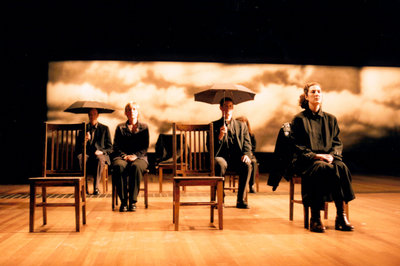With the nation focused on the issue of antigay bullying and the recent teen suicides that have resulted, two plays have become more timely than ever as they explore the impact the 1998 murder of Matthew Shepard had on the town of Laramie, Wyo. , and the nation at large.
The Annenberg Center for the Performing Arts will host Tectonic Theater Project as it presents both “The Laramie Project” and the new companion piece “The Laramie Project: Ten Years Later,” Nov. 11-13.
Philadelphia is one of the few cities where both plays are being performed on Tectonic Theater Project’s current tour. Greg Pierotti, who helped to write and acts in both performances, said the project — based on interviews with Laramie residents a decade after Shepard’s murder — is more relevant to what is happening in the LGBT community today.
“Particularly in part two, there’s material that resonates with the suicides that are being reported,” Pierotti said. “I mean, they have been happening since forever, but for some reason the national media has started paying attention to them now.”
Moisés Kaufman, the director and one of the writers of the Laramie plays, explained how seeing both of the plays together deepens the understanding of them.
“There’s something rather epic about both of them being together,” he said. “It becomes a very large American story. It becomes the story of an American town over 10 years of its existence. The first play has a more immediate kind of feeling. The second play lets you see what happens over the course of 10 years.”
Both Kaufman and Pierotti conducted some of the interviews for the plays and were shocked at how time had distorted the facts and the sentiment in Laramie toward Shepard’s murder.
“A lot of the quick interviews we did on the street, walking up to people asking them what they remember about Matthew Shepard, were kind of shocking too,” Pierotti said. “We were walking up to kids on the campus and some kids hadn’t even heard of him. That was a little bit shocking to find on the University of Wyoming campus. Then there were all the people that were telling a wildly different story about what happened to Matthew: that it was a drug deal or a robbery that went bad. One person said that he heard that Matthew was a drug dealer. Those were kind of shocking things to hear. I guess the most surprising interview for me was when I interviewed Aaron McKinney in prison. I found a lot of that interview quite shocking. He’s become a white supremacist since he went to prison. I wasn’t really expecting that. He wasn’t able to articulate any remorse for what he did to Matthew, which I was pretty shocked by after 10 years.”
Pierotti added that traveling the country and experiencing the mixed and sometimes contradictory reactions to “The Laramie Project,” which can range from acclaim to protests, can be baffling.
“It’s very confusing for me to be going around the country and engaging with these communities because my faith in each community that we’re in is so disparate,” he said. “Certain days I feel like there’s hope and then on other days I feel like, what is happening in this culture? It depends who you talk to. There’s too wide of a discrepancy between people who are concerned for the wellbeing, safety and equal rights of gay people and people who could give a shit. I find all of this in every single community that we’ve been in, but I feel a little bit like maybe I’m naïve. Living in New York, I always feel like things are better than they are.”
Kaufman said he isn’t surprised by the different reactions to their work.
“I find that that is kind of a representation on where the country is at this moment,” he said. “We are divided, literally, down the middle almost around issues of social justice and acceptance. Depending on the poll, half the people in the country believes in gay marriage and half the country is against gay marriage. We are in the middle of a battle and I think it’s irrefutable that some progress has been made in the last 10 years. I think every time that we encounter some progress there’s always a backlash.”
Even if the impact isn’t always what the creators of “The Laramie Project” would hope, Pierotti said both plays have something to offer for both gay and straight audiences no matter what their background or residence.
“Some of us have had antigay violence directed toward us growing up. For gay audiences, there’s a lot more identification and people are moved by a shared situation, but I think straight audiences are pretty provoked by the play to kind of change their own attitudes, and I think often people are shocked by how unsafe it really does feel in the world for gay people. Because I think a lot of the straight audiences that come see the play aren’t homophobic: They have a heterosexual privilege and they just haven’t questioned how easy that has made things for them.”
The Annenberg Center for the Performing Arts presents “The Laramie Project” at 7:30 p.m. Nov. 11 and 2 p.m. Nov. 13, and “The Laramie Project: Ten Years Later,” 8 p.m. Nov. 12 and 13 at Zellerbach Theatre, 3680 Walnut St. For more information, visit tectonictheaterproject.org or call (215) 898-3900.
Larry Nichols can be reached at [email protected].

